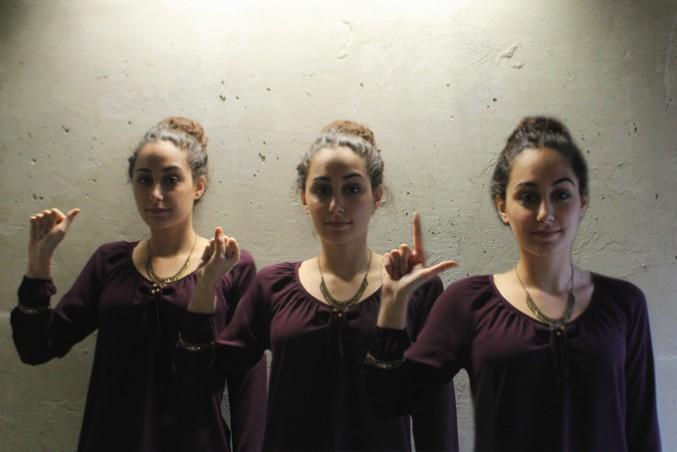By Nicole Schmidt
Since starting their studies at Ryerson, first-year theatre student Thomas Brown* has been dealing with a long list of accommodation issues. On the first day of one of their classes, they says their professor suggested dropping the course because it would be “too hard.”
Brown was born Deaf, and the lack of appropriate resources on campus makes it difficult for them to fully participate.
“It’s so sad to see that people underestimate me because of my Deafness,” said Brown. “Ignorance made me to lose my motivation in school. I ended up missing many days … I was failing a course because there was no support.”
Accommodation for deaf students has always created challenges at Ryerson. A new task force is being assembled to address these issues, but several members of the deaf community have expressed concerns about a lack of representation.
Denise O’Neil Green, assistant vice-president/vice-provost, equity, diversity and inclusion (EDI), was selected as chair of the committee. She’s also responsible for overseeing seven other committees and administrative groups, including the Aboriginal Education Council and the Academic Senate. O’Neil Green has experience with a variety of accessibility issues on campus, but she does not have specific expertise dealing with the problems deaf students face.
“The idea of bringing Denise [in] was really to consult. We are not bringing her as a specialist,” said interim president Mohamed Lachemi. “I think she has a very good understanding of issues faced by students in different categories.”
In October 2015, Ellen Hibbard — a Deaf Ryerson alumna who received her PhD in communications and culture from the school in 2015 and promotes access on campus — and Deborah Fels — the inclusive media design centre’s director — suggested the creation of a task force lead by a deaf consultant to help reduce barriers on campus. Lachemi was the provost and vice-president academic at the time.
Plans have been made to add a deaf person to the task force and the committee is expected to seek external input. But in a community that’s often isolated because of a communication barrier, Hibbard said it’s important that the majority of the committee has experience with deaf specific issues. If members aren’t fluent in American Sign Language (ASL), it becomes a lot more difficult for them to meet with deaf students to discuss problems.
“It is not possible to ask someone who has general knowledge of inclusion and access to apply general knowledge to Deaf people because Deaf people have unique issues, culture and language,” said Hibbard. “It’s like having a male task force to address discrimination and oppression against women.”
Fels said there’s a large pool of knowledgeable staff and students at Ryerson — disability studies faculty, Deaf alumni and Deaf faculty all have a lot of insight. She added that having a “token deaf person” on the task force isn’t enough.
“They’re just throwing more VPs and directors at the problem,” she said. “Hearing people think they know what’s best for deaf people and that’s a problem … deaf students are feeling like they’re being pushed around and not being heard. This committee is more evidence to the problem.”
Hibbard and Fels said they scheduled a meeting with O’Neil Green to discuss some of the issues in March 2015, but had to cancel because Fels was sick. Both said they’ve made several attempts to reschedule over the past 11 months, but O’Neil Green has not returned any of their calls or emails.
O’Neil Green said in an email that EDI is fully committed to values of community and inclusion, and that all students, faculty, staff and alumni are welcome to share their experiences. “I definitely plan to reach out to our alum and schedule a meeting to address any miscommunication that may have occurred,” she wrote.
Ryerson does not have any ASL interpreters on staff. Marc Emond, manager of Academic Accommodation Support, said these services must be booked externally at least two weeks in advance. Booking interpreters for classes can take longer because sometimes they need specialized training, depending on the course content.
Sidney Drmay, coordinator at RyeACCESS, added that the university doesn’t have accredited ASL classes. RyeACCESS offers courses, but they can only take 30 students per session — despite a larger interest.
New staff are required to do a mandatory online training course and additional training is available through Ryerson’s Academic Accommodation Services. But Fels said the training is not sufficient. “Knowing about a standard and implementing those things in a classroom are two very different things,” she said. “Every disability needs a different approach.”
Ryerson’s Academic Accommodation of Students with Disabilities policy says that instructors should “strive to make course curriculum and materials and course activities accessible to all students,” and the Accommodation for Persons with Disabilities Policy says that students will be considered individually to determine accommodations.
Still, some Deaf students have experienced discrimination and have had problems with faculty not properly accommodating them.
Brown said one of their professors refused to show videos with subtitles. Jenny Leung, a third-year business technology major who is also Deaf, said she had similar issues with closed captioning services.
“We expect professors to know what to do … and students to take on the advocacy needed to convince a professor the right way to do things,” said Fels.
Heather Willis, accessibility coordinator in the office of Equity, Diversion and Inclusion at Ryerson, said it’s not about integrating disabled people into spaces — it’s about integrating accessibility into what already exists. “Disability is created by societal barriers,” she said. “We’re not there yet, but we’re always learning from each other and sharing ideas to make things better.”
*Name has been changed for anonymity










Twoey Gray
Having accredited ASL classes would be super helpful at Ryerson. I was in the ASL 101 but was forced to stop going because of class commitments, when multilingualism is something I want to prioritize.